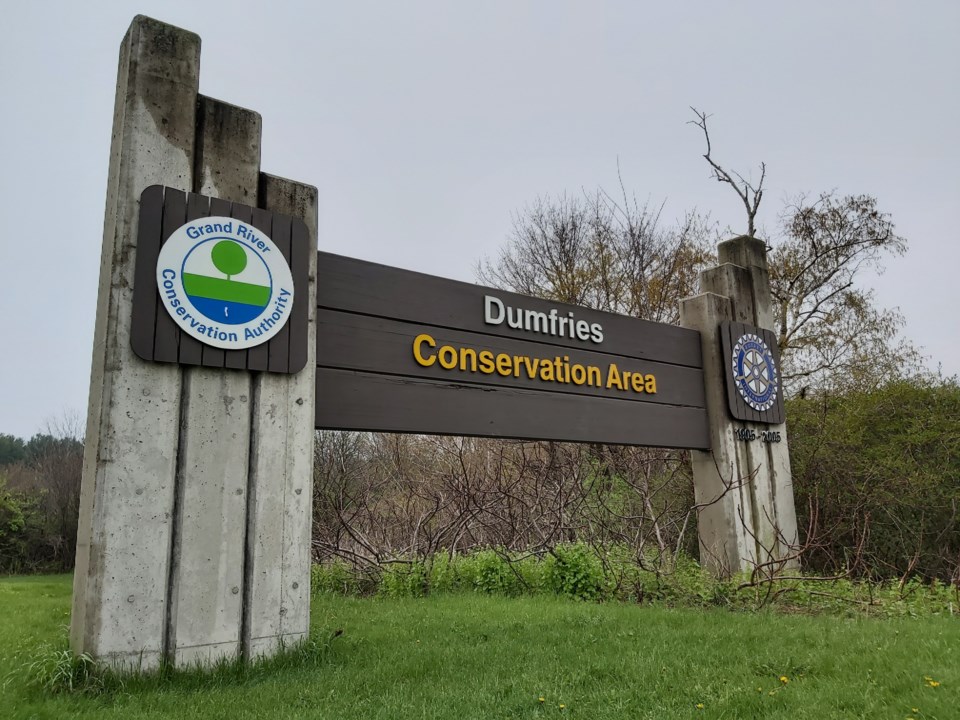Homeless encampments in the forested area of Dumfries Conservation Area have been a "major source of interest" for staff at the Grand River Conservation Authority for about a decade.
But the problem has become so prevalent over the last year it's put a strain on the GRCA's operating budget and staff.
This morning, members of the GRCA's board of directors learned 41 encampments were identified in the central Cambridge conservation area alone since May of last year, requiring 300 to 350 hours of staff time to deal with.
Manager of conservation area operations Pam Walther-Mabee called this year's numbers "an incredible spike," after dealing with encampments at the Dunbar Road park for years.
She said staff have noticed the recent increase is in direct correlation with encampment evictions in other areas of the city.
Between May and August, the conservation authority was forced to hire two student security guards to patrol all GRCA lands, with a specific focus on Dumfries.
That's in addition to two external security guards the GRCA hired in August for weekend patrols of the Cambridge conservation area.
And Cambridge is far from alone in dealing with the issue.
Other hot spots throughout the watershed include locations in Brantford, Kitchener, North Dumfries and Centre Wellington.
"We've had an ongoing challenge with managing our encampments across the watershed," Walther-Mabee said, but the numbers reported at every other location are dwarfed by the challenge at Dumfries.
Managing the growing issue involves regular site visits, assessment, engagement, evictions and cleanup.
Most encampments require four to five site visits before the issue is resolved and cleanup can begin, and it takes about 40 hours of staff time per issue.
Costs to deal with it over the last two years exceed $42,000 as of July 31. The costs for additional security and the ongoing clean up efforts are not yet finalized.
In addition to the cost, staff are put at risk while enforcing trespassing notices and have been trained to use de-escalation tactics when necessary, she said.
High-risk situations can also include exposure to bio-hazards like human waste and needles, not to mention the need to navigate through difficult terrain to get to some remote sites.
The GRCA has had to utilize professional cleaning companies for large scale site cleanup, especially when there are bio-hazards.
The GRCA has had a policy to deal with encampments since 2016 but in recent years has responded to incidents on its land with a view to the 2023 Superior Court ruling that human rights and freedoms need to be considered closely when approaching these situations.
Municipalities are bound to the ruling and cannot evict encampments on public property unless they have enough appropriate shelters in place for the people they're evicting.
GRCA lands are different than municipal properties, however, because they're private.
GRCA works with municipal partners, bylaw officers and police to address the issue, Walther-Mabee said, adding those partnerships are critical to managing the conservation authority's risk and liability.
Going forward, the GRCA will continue to train its staff about engagement protocols to ensure their safety, and will respond to calls, emails and social media posts requesting action to stay on top of the problem as time and resources permit, she said.
Cambridge councillor Mike Devine knows it will be an uphill battle for the GRCA to keep encampments out of a park that's "right, smack dab in the centre of Cambridge." He offered kudos to GRCA staff for trying.
"It's huge, very heavily forested. Its a beautiful spot," he said. "It's directly across from the mall, so if you're going to camp, it's a great place to camp."
After scouring Dumfries looking for tents with GRCA staffers Nick Randle and Joel Doherty about a month ago, Devine said he doesn't know what more can be done.
Seeking financial restitution from people charged with trespassing isn't an option either.
"Unfortunately when it comes to laying charges, they have no ability to pay the charge, they have no ability to pay restitution," Walther-Mabee said.
She added having encampment response included in the GRCA's operating budget could be something to consider, but the issue is so so variable that GRCA staff have been managing cleanups on an as-needed basis.
"Dumfries is a constant, but there has also been numerous encampments throughout the watershed," she said.
Brantford Mayor Kevin Davis believes the province's Trespass To Property Act needs to be strengthened to help municipalities deal with "aggressive and repetitive trespass" and said he's advocated for that to happen at Queen's Park.
"I've been working, just recently with the mayor of Cambridge in respect to advancing an initiative we hope would result in some legislative changes to give those who are dealing with encampments some additional tools that perhaps would let them deal with it more effectively," he said.
But Region of Waterloo councillor Kari Williams cautioned the board on its approach and wanted clarification on how the GRCA works with its municipal partners to ensure kindness is a priority, including offers of alternative housing and other supports.
"These are actually people who are really struggling," she said.
Walther-Mabee confirmed that's part of the protocol that's been in place since 2016.
"The thing that bothers me are some of the dangerous aspects of some of the encampments," said regional councillor Doug Craig, referring to three recent fires and the common use of propane tanks.
He urged the GRCA to look at the issue as something that will be around long term and wants an ongoing report from staff on what they're seeing.



